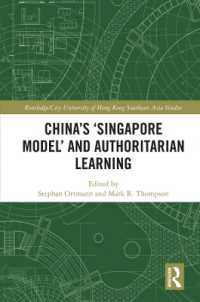- ホーム
- > 洋書
- > ドイツ書
- > Mathematics, Sciences & Technology
- > Sciences
- > sciences generally
Full Description
This book, translated from Italian, discusses the influence of Galileo on Hobbes' natural philosophy. In his De motu, loco et tempore or Anti-White (‾ 1643), Thomas Hobbes describes Galileo as "the greatest philosopher of all times", and in De Corpore (1655), the Italian scientist is presented as the one who "opened the door of all physics, that is, the nature of motion." The book gives a detailed analysis of Galileo's legacy in Hobbes's philosophy, exploring four main issues: a comparison between Hobbes' and Mersenne's natural philosophies, the Galilean Principles of Hobbes' philosophical system, a comparison between Galileo's momentum and Hobbes's conatus , and Hobbes' and Galileo's theories of matter. The book also analyses the role played by Marin Mersenne, in spreading Galileo's ideas in France, and as a discussant of Hobbes. It highlights the many aspects of Hobbes' relationship with Galileo: the methodological and epistemological elements, but also the conceptual and the lexical analogies in the field of physics, to arrive, finally, at a close comparison on the subject of the matter. From this analysis emerges a shared mechanical conception of the universe open and infinite, that replaces the Aristotelian cosmos, and which is populated by two elements only: matter and motion.
Contents
1. Hobbes and Mersenne.- 2. Hobbes: Principles of Galileian Philosophy.- 3. Galileo's Momentum and Hobbes' Conatus.- 4. The Paradoxes of Matter.- Conclusion.








